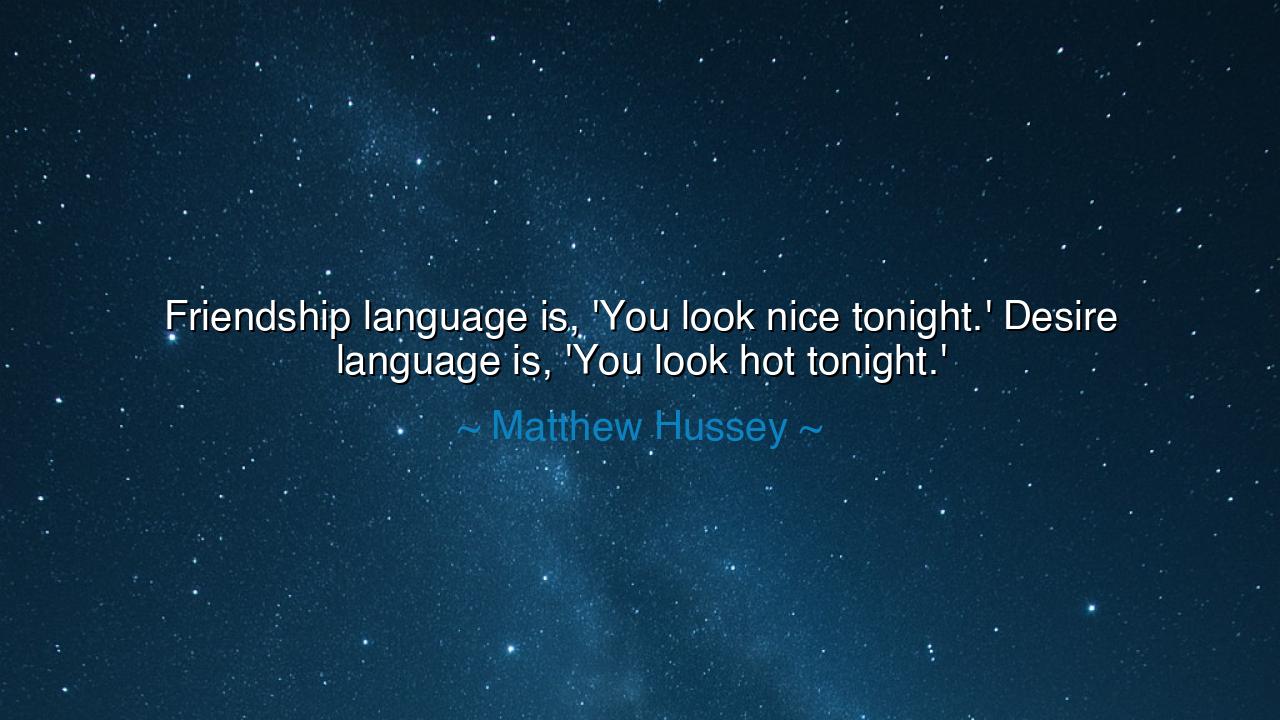
Friendship language is, 'You look nice tonight.' Desire language
Friendship language is, 'You look nice tonight.' Desire language is, 'You look hot tonight.'






In the vast and intricate dance of human connection, the nature of language—the words we speak and the intentions they convey—can reveal the deepest currents of our relationships. In the words of Matthew Hussey, "Friendship language is, 'You look nice tonight.' Desire language is, 'You look hot tonight.'", we are granted a profound insight into the nature of human interactions and how the same words, subtly altered, can reveal entirely different emotions and intentions. The subtle shift from friendship to desire is not merely a change in words, but a shift in the underlying connection—a transformation from admiration to attraction. This quote is not merely about the choice of adjectives but about understanding the deeper currents of human connection and how we communicate what we truly feel.
The ancients were keenly aware of the power of language. In ancient Greece, the philosopher Plato wrote about the nature of love in his work Symposium, where he explored different forms of love and desire through dialogue. For Plato, eros, the passionate desire between lovers, was distinct from philia, the deeper, more enduring love shared between friends. The language of eros was often intense, filled with longing and physical attraction, while the language of philia was more subtle, characterized by mutual respect and admiration without the undercurrent of sexual desire. Plato’s exploration of love in all its forms was a recognition of the different ways that we communicate affection and attachment—how the very words we use can reflect the nature of our relationships and the intentions behind them.
This distinction between friendship and desire language is not new. Throughout history, great writers and thinkers have explored the complexity of human relationships. The famous Roman poet Ovid, in his work Ars Amatoria (The Art of Love), taught that the language of love should be direct, passionate, and bold, while the language of friendship was quieter, more refined, and often unspoken. Ovid understood that romantic language and friendship language were not interchangeable; they arose from different needs, each expressing something unique about the human experience. Ovid's understanding of love reflects a timeless truth: that the way we express our feelings can reveal much about what we seek from others, whether it is the closeness of friendship or the intensity of desire.
In more recent times, the romantic literature of Jane Austen, in works like Pride and Prejudice, also explores the nuances of language in relationships. In the interactions between Elizabeth Bennet and Mr. Darcy, for example, we see how language moves from polite, even distant exchanges, to more intimate, passionate declarations of love. Austen carefully constructs the language of desire, as her characters move from a place of friendship to a more complex relationship that combines both deep affection and romantic longing. The subtle shift in language in these moments speaks to the evolution of human connection, where words like "nice" can evolve into more intimate and charged expressions like "hot," reflecting a change in emotional and physical connection.
Consider also the story of Cleo, the queen of Egypt, whose relationships were deeply shaped by the power of language. When Julius Caesar arrived in Egypt, Cleo’s language was not one of mere diplomacy; it was one of seduction and desire. Later, with Mark Antony, their relationship was marked by passion and intensity—their words often held not just admiration, but the unmistakable undertones of romantic longing. Both of these men, though politically engaged, were drawn to Cleo not just by her intellect but by the intensity of their feelings for her. In this way, language became the very tool through which desire was communicated, and it was through this shared language of romance and passion that powerful figures were bound by emotional and physical ties.
The lesson here is profound and clear: the language we use reveals more than just what we say—it reveals what we feel, what we seek, and how we relate to others. In friendship, we find that our words are often gentle, supportive, and devoid of romantic intent. Yet, in desire, our language becomes more direct, charged with passion, and filled with the promise of intimacy. Understanding this distinction is crucial, for it is through our words that we communicate our true desires and intentions. Whether we are speaking with friends, lovers, or strangers, the language we choose carries the weight of our feelings and shapes the way our relationships unfold.
In your own life, consider how you speak to those you care about. When engaging in friendship, let your words reflect the kindness, respect, and empathy that bind you to another. But when the bond shifts to something more romantic, embrace the language of desire, understanding that words like “you look nice” and “you look hot” are not merely superficial compliments, but expressions of emotional and physical connection. In doing so, you will better understand the power of language to shape the course of your relationships, and you will come to appreciate how the words we choose can transform our bonds—whether they are rooted in friendship or desire—into something deeper, more intimate, and more profound.






AAdministratorAdministrator
Welcome, honored guests. Please leave a comment, we will respond soon